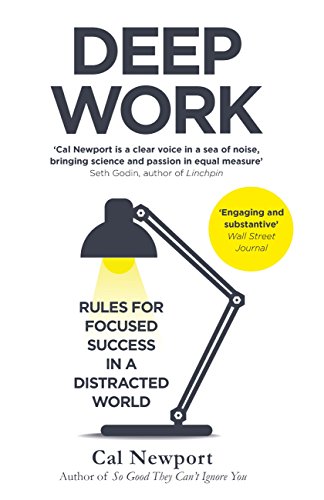
What is Deep Work?
According to Cal Newport, Deep work refers to professional activities that are performed in a state of distraction free concentration so that your cognitive capabilities are pushed to their very limit. This helps you create value as well as improve your skills. But they are also hard to replicate and requires discipline to sustain.
What About Shallow Work?
Contrary to deep work, there is also something Shallow Work. Shallow work has to do with performing non-cognitively demanding, logistical style tasks that can be carried out while one is distracted. Results of this type effort do not create any real value in today’s world and are mediocre at best.
But let’s face it: For a profession like software engineering where insane amounts of concentration is needed to master a task, shallow work becomes the number one enemy.
The Problem
We live in a time where everything has to be done in a “fun way” at the very least to conjure up interest. We went through that cycle in both our nursery, pre-nursery, primary and post-primary years. Nothing wrong with fun in itself. But if we are to make any headway at all in today’s thriving economy then it means we have to quickly master hard things and produce works that can match up in terms of both quality and speed. And to tell you the truth? None of it is fun, at least not initially.
When you start out as a software engineer, you usually start out with good intentions, at least most people do. There’s a lot to both learn and master. You need to remember to close your curly braces, add semi-colons, check if the JSON response is valid, and master tons of other concepts. Mastering all these will require time. To learn hard things quickly, you must cultivate the habit of focusing intensely on tasks without distraction for long periods of time, and this is what deep work is about.
Getting Started With Deep Work
After you have embraced your need for deliberate and focused concentration and have made up your mind to hone your craft and apply it with skill and care, you may be unsure of what to do next. Here are some steps you can take to perfect the deep work concept.
1. Choose Your Strategy:
Cal Newport describes four different types of deep work scheduling you can choose from and these are:
- The Monastic Philosophy of Deep Work Scheduling, which happens to be the most dedicated form of deep work. It involves spending all of your working hours on a singular high-level focus task. This philosophy has the highest potential for reward and the lowest level of task switching, but it can be unrealistic for most people, especially those who are required to perform various kinds of work in their role. It also blocks the potential for new opportunities as you will likely refuse all other forms of commitment.
- The Bimodal Philosophy of Deep Work Scheduling. This allows you to perform a high amount of deep work while still helping you to maintain other valuable activities in your life that you. This method makes your work pattern and routines flexible.
- The Rhythmic Philosophy of Deep Work Scheduling. This method is ideal for individuals who are in full control of their day. If you can anticipate what most of your days will look like, it is possible for you map out some time for deep work and allocate the rest to shallow work.
- The Journalistic Philosophy of Deep Work Scheduling. This option is suitable for people who are constantly on the move with little to no regularity to their days. This method requires you to flow naturally with whatever available time you have so that at least you are able to perform 30 minutes or an hour plus of dedicated and focused concentration However, this method is not suitable for beginners and is likely to fail for people who are not experienced in deep work.
2. Choose a Suitable Location:
It is usually best to choose a space that’s distraction free and conducive for you to focus. If such is not available you can instead opt for noise cancelling headphones that will help you to improve focus. It is also important that you be consistent with your chosen environment because a familiarity with your location will allow you to get into the deep work mode faster.
3. Set Realistic Duration:
Before starting out on a deep work session, it important to determine precisely how much time you’ll devote to your chosen task. You can start with as little as 15 minutes, and work your way up to longer sessions. Don’t try to set unrealistic goals and expectations; your ability to focus will improve as you maintain focus and consistency.
4. Determine Your Structures
What constitutes deep work to you, and how will you measure your success? Can you take tea breaks? Will your cellphone be turned on or off? Can you check your emails? Whatever your decision, it is best to stay true to yourself and do what works for you.
5. Be Consistent With Your Chosen Structure
Consistency is the bane for mastery. It is better to maintain a daily 15-minute routine than to have occasional 3-hours deep work marathon with intervals that are weeks apart. As you begin to maintain consistency, you will be able to measure your improvements and improve upon your chosen structure.
6. Maximize Downtime
Downtime here refers to the periods when you are done with your tasks or your workday is complete and you are not actively working. It is important to note that working and focusing all day without downtime can have a negative impact on your focus and concentration. Downtime improves thinking and improves capacity to carry out deep work.
Conclusion
As our world becomes increasingly competitive, deep work becomes necessary to quickly handle and master hard things. With consistent and daily efforts, deep work can generate more meaning in your professional life and help you produce work at an elite level.


